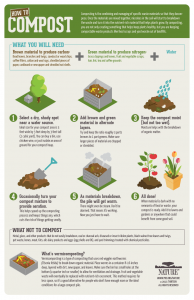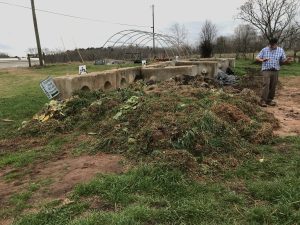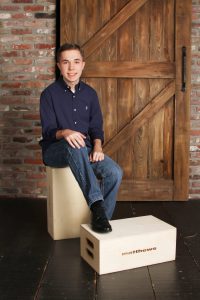For my final project, a few of my classmates and I went to East Campus Village and did a presentation on the importance of composting. In preparation, we made a PowerPoint based on our research of what to compost, what not to compost, the benefits of composting, and similar ideas. I was in charge of researching materials that are able to be composted. The process of looking up and summarizing information is something I may use in the future. Our research showed that only biodegradable things, such as food scraps, can be composted. Metals and plastics should not be composted under any circumstances. While it is possible to compost meat, it is not recommended since it can attract animals. Composting helps the environment by improving the quality of water and crops. Composting also decreases the total amount of carbon dioxide in the atmosphere. My research and creation of the presentation greatly improved my knowledge of composting. Our presentation is intellectually stimulating because it forced the audience to consider how the world would be different if more people composted. It is relevant since composting can greatly impact the near future for the better. The images my classmates used on each of the slides could also be considered creative. My research led me to discover that it is a bad idea to compost meat and composting can reduce the carbon dioxide levels in the air. I analyzed the audience and noticed that there were a few individuals who seemed uninterested, as they were not making eye contact with us while we were presenting. In the future, I may want to create presentations with a few jokes or other aspects that would grab the audience’s attention. In the future, I will make sure to prepare better for questions the audience may have after I finish presenting a slide. The experience allowed me to better understand the aspect of the course focused on composting and improving the environment. The prior research was the factor that contributed the most to this understanding. I can use the information I learned to create my own compost pile at home and grow high quality crops. I tried to come off as an informed individual to the audience, which I believe I succeeded at. I would like to try and get better at answering questions in the future. This assignment was effective for me, because it allowed me to learn much about real world issues and a solution I can use in my own time. I thought the feedback on being better prepared for questions was very helpful.
Author: gdg48682
Group 2 (Creating Compost) Comments to Group 3 (Managing Compost)
Looked good overall. You could add more detail with each step –> maybe address why each step should be taken. You could add more graphics to make the page more appealing.
Infographic Blog Post – Greg Gruschow
This infographic is informative on what to put into compost, the moisture and shade levels of good compost, and how to properly maintain compost. Good compost should be mostly brown and green, as well as slightly moist. Occasionally turning the compost pile can also help. This infographic surprises me, because I originally had no idea how many factors needed to be taken into account when making compost. I thought the materials that went into the compost pile were the only thing that mattered, but this infographic taught me how moisture and shade also play a major role. I believe it is important for our local students to learn that there is more to composting than just piling up scraps.
UGArden Reflection – Greg Gruschow
In this picture, I see a pile of compost and one of the gardeners explaining the function of compost. When I look at this picture, I notice how most of it looks like ordinary dirt and grass, with the exception of a couple crops towards the left side of the pile. This picture makes me think about the many methods farmers use to help the environment and be more efficient when growing crops. When I look at this picture, I feel a slight urge to research ways I can help the environment myself. I think this picture is about the many different plants and other things that can go into composting.
Introductions – Greg Gruschow
In high school I took science classes involving biology, chemistry, and physics. Chemistry was my favorite, because I enjoyed learning about the basic building blocks of matter. In this course I would like to know more about the internal processes of plants, such as photosynthesis. In terms of composting I would like to learn more about how compost specifically helps plants as opposed to other types of soil. I think my fellow students would be interested in what the topic of global warming involves and how it can affect them in their lifetimes. I think by learning about what composting does, this class will teach me how big of a problem global warming can be.



